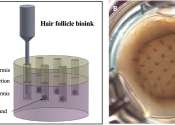Detecting lung cancer early with sugar-sensing nanotech
For such a common disease, lung cancer can be hard to spot. In the early stages you probably won't even know you've got a problem. But by the time you investigate that persistent cough, your livelihood may already hinge on ...









